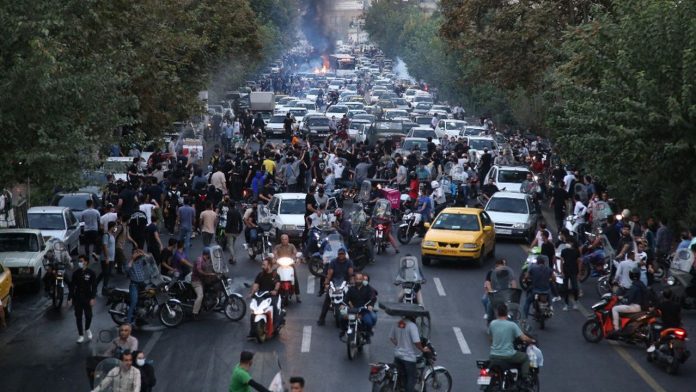Posted Oct 1, 2022, 1:00 PM
“Gas producers currently have an immunity totem.” The lack of Western reaction to the Azeri aggression against Armenia, commented on by Dorothée Schmid, of the French Institute of International Relations (IFRI), was one of the many aspects of the hot spots of the planet scrutinized during the Strategic Meetings of the Mediterranean organized on September 27 and 28 in Toulon.
Meetings organized in the first military port of this mother sea of the majority of modern civilizations, by the Mediterranean Foundation for Strategic Studies (FMES) and the Foundation for Strategic Research (FRS). The main geopolitical issues of the day were addressed, well beyond a still strategic Mediterranean: today a quarter of world trade and a high proportion of international digital cables pass through it.
Moscow at the heart of concerns
Nevertheless, it was the war in Ukraine that logically figured in the foreground, with Vladimir Putin’s threat to resort to tactical nuclear weapons, which was on everyone’s lips. Without anyone, among the many soldiers and representatives of think tanks present, being able to make very convincing forecasts.
However, Russia has “already lost the war on the geopolitical level, estimated Valérie Niquet, head of the Asia pole at the FRS, with the loss of Germany’s confidence, of its status as a reliable power in the hydrocarbons and the fact that his invasion of Ukraine has united the Atlantic Alliance and the European Union. The current unity of the latter is perhaps even without equivalent in fact, in its history”. The only uncertainty being whether, in addition to these major geopolitical setbacks, Moscow will resolve to also admit defeat on the battlefield.
But “the ongoing Russian mobilization is unlikely to substantially change the balance of power on the ground,” says Céline Marangé, of the Institute for Strategic Research at the Military School (IRSEM). The recruits will lack equipment and will benefit from a summary training, for lack of time and, above all, of non-commissioned officers, who are generally at the front or dead. The risk of reaction in the population is not negligible, not to mention the destabilization of Russian society and economy by the departure of hundreds of thousands of professionals since the beginning of the invasion and, even more, the mobilization ten days ago.
Ukraine is fighting for its survival
The outcome of the conflict is also “a matter of life or death for Ukrainians convinced that Moscow has been seeking for centuries in fact to subjugate them, even now to destroy them”, underlines Alexandra Gougon, specialist in the country and teacher-researcher at the University of Burgundy. Kyiv’s renunciation of NATO at the start of the conflict could be understood as an attempt at compromise by President Volodymyr Zelensky, who said that he “did not want a country of dead heroes”, but since the war crimes, destruction and the policies of authoritarian Russification of the conquered territories (passport, imposition of the ruble, modification of school programs) have made any “deal” unthinkable for the moment”. Ukraine will feel in danger as long as Moscow does not give up, or as long as Russia is able to carry out a neo-imperialist policy. This explains the reinstatement, this Friday, of the application for NATO membership announced by President Volodymyr Zelensky.
Bruno Dupré of the European External Action Service also underlines that India, Turkey and China, privileged partners of Moscow, no longer hide their anger towards Putin’s adventurism. The war threatens to trigger a global recession that would destabilize China’s highly export-dependent economy. Especially since, recalls Maya Kandell, researcher at the Sorbonne, Beijing is in difficulty with the slow bursting of the real estate speculation bubble, which “has all the characteristics of a huge Ponzi pyramid”. The rise in hydrocarbon prices also affects Beijing, the world’s largest oil importer.
The Iranian regime pitches but does not sink
The other major geopolitical issue of the moment is Iran. If the regime seems to have fulfilled its objective of becoming a so-called “nuclear threshold” country, capable of producing an atomic bomb in a few weeks if necessary, as it moreover assumed in veiled terms this summer, it is currently threatened by the most virulent protest for 13 years. Which will probably be repressed by a regime that has been tested in this area, like the previous waves of 2018, 2019 and 2020, warns Agnès Levallois, of the FRS. The Islamist regime believes that it is playing its survival, because the current protest is aimed at the veil of women and the police of morals, the keystone of its doctrine.
A stupefaction that creates opportunities
However, the embers are not only blowing in Ukraine. “The general effect of stupefaction before the war offers opportunities for certain countries to push their pawns away from the gaze of Western chancelleries”, summed up Dorothée Schmid. We saw it with the attack on Armenia by Azerbaijan, but also with the Turkish, Saudi and Iranian games, without prejudging China’s projects in Taiwan.
The Turkish regime, precisely, is playing on the fact that everyone needs him at the moment, in particular on the fact that he is the only credible mediator in Ukraine, according to the speakers. A neutrality which may be difficult to hold in the long term, even if the Turks recall that their country was neutral during the Second World War. If Ankara is patching up with Iran, Saudi Arabia, Israel, Syria, after years of all-out antagonisms, its current threats towards Greece may lead us to fear the worst.
Pierre Razoux, director of research at the FMES, “would not be surprised if the Turkish President, Recep Tayyip Erdogan, on the eve of a delicate presidential election next spring, invades one or two Greek islands in the Aegean Sea”. A violation of the 1923 Treaty of Lausanne which would be dramatic, opposing two members of NATO, one of which, Greece, has only signed a bilateral defense agreement with one country: France… ‘Erdogan who would be all the more profitable since “in Turkey nationalism is the most abundant and best shared resource”, recalls Dorothée Schmid.
Not far from it, Israel, because the so-called JCPoA treaty of 2015 on the verifiable freezing of the Iranian nuclear program is “dead with no hope of resurrection in the medium term”, could try to simplify its strategic equation by attacking Hezbollah next year, dreads Pierre Razoux.
Three Shattered Prophecies
The Chief of Naval Staff, Admiral Pierre Vandier, summed up in conclusion: “The last few years have shattered three candid prophecies: the fact that the market economy necessarily led to democracy, that economic interdependence necessarily contributed to peace” (Russia was very dependent on the West…just as, in 1913, the United Kingdom was Germany’s main trading partner), “and that disarmament would lead to peace. Herbivores will fail to persuade carnivores to file their teeth.”













